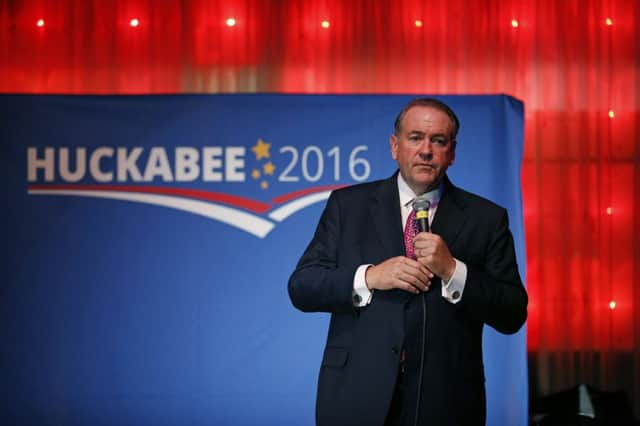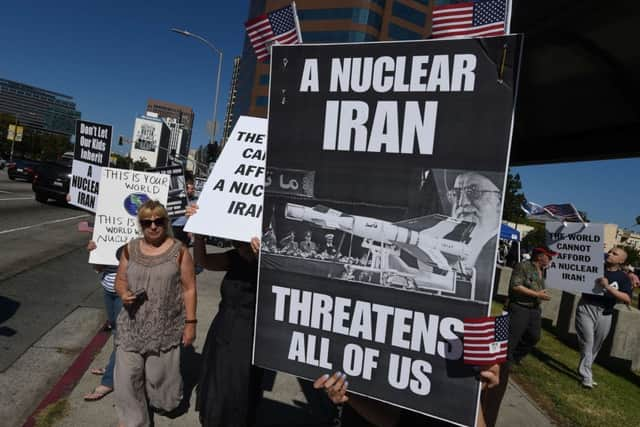Allan Massie: Good to have Iran in IS fight


You expect intemperate language from American politicians competing for their party’s presidential nomination. Outsiders have to make an impression. If they don’t sound off loudly, they won’t be noticed. Hence the tone of the Republican hopeful, Mike Huckabee, denouncing the deal with Iran: “The president’s foreign policy is the most feckless in American history. He’s so naïve he would trust the Iranians and he would take the Israelis and basically march them to the door of the oven… What’s ridiculous and sad is that president Obama does not take the Iran threats seriously. For decades Iranian leaders have pledged to ‘destroy, annihilate, and wipe Israel off the map’ with ‘a big holocaust’.”
Well, the former governor of Arkansas has achieved his aim: he has got noticed. Better still, president Barack Obama has said such views would be considered ridiculous if they weren’t so sad. This sort of condescending response is one of the many things about Obama that infuriate Republicans. Be that as it may, what of Mr Huckabee’s charge?
Advertisement
Hide AdAdvertisement
Hide AdThe deal resulted from months, indeed, years, of intense negotiations, and it wasn’t, of course, a bilateral US-Iran deal. All the permanent members of the UN Security Council were involved, and all have declared themselves satisfied with it. In return for an easing of sanctions, Iran has accepted severe limits being placed on its nuclear programme and opened its sites to inspection. Sanctions will be re-imposed if it doesn’t keep its word. Doubtless a better deal is imaginable, but no better deal was obtainable. At the worst Iran’s ability to develop nuclear weapons has been pushed back ten years. Nuclear proliferation has again been checked. There’s no need now for Saudi Arabia, which also fears Iran, to demand the right to have nuclear weapons – something that, unlike Iran, the Saudis could certainly afford.


What of the danger to Israel? Prime minister Benjamin Netanyahu has denounced the deal, if in milder language than that employed by ex-governor Huckabee. Well, at the very least, since Iran doesn’t have nuclear weapons and won’t have any for quite a long time, Israel’s security is no more threatened today or tomorrow than it was yesterday. It is true that, as Mr Huckabee says, Iran has pledged to destroy Israel, and has done so for decades. It might, however, occur even to a Republican would-be candidate that Iran has scarcely translated verbal threats into action. Even its proxy Hezbollah, based in Lebanon, hasn’t caused Israel much trouble for years now. The fiery words from the mullahs and the former president Mahmoud Ahmadinejad have been intended for home consumption – to keep people on the alert and maintain the revolutionary spirit. Israel has been a convenient bogey. No doubt the mullahs, like leaders in the Middle East, would rather the State of Israel had never come into being (even though they have found its existence convenient), but they have done precious little about it.
Likewise the Iranian threat has been mighty convenient to successive Israeli governments. For years Israeli leaders have been telling us that Iran was within a year or two years or sometimes five years of having nuclear weapons, and must be stopped. If the Americans wouldn’t act, then Israel would have to do so itself. And yet, somehow, the moment for such “necessary” action never arrived. Wasn’t a game of bluff being played by both sides? The Cold War between Iran and Israel didn’t turn hot, even when there were skirmishes with Iran’s proxies on Israel’s borders, the temperature never rose above lukewarm. But talking up the Iranian threat ensured continued American military support for Israel.
It’s now 36 years since the Iranian Revolution which overthrew the Shah and established the Islamic Republic. In that time the mullahs and the politicians they permit to hold office have indulged in much violent talk, but the extremism of their language has, for the most part, been matched by the moderation and caution of their acts. Even the infamous fatwa pronounced against Salman Rushdie, when his novel The Satanic Verses was published, was not carried out. One of his translators and one of his foreign publishers were murdered by, apparently, freelance zealots, but can anyone doubt that, despite the protection given Rushdie by the British state, he would at some point have been killed if the Iranian state had really been determined to dispose of him?
No doubt the deal now made with Iran is not perfect. We – the West – may have got less than we hoped for; the Iranians have conceded more than they would have wished to. There’s nothing surprising about that. As Sir Walter Scott has Bailie Nicol Jarvie say in Rob Roy, “there’s naething this side o Time but it might hae been better”. Fair enough, but dialogue is better than the exchange of threats and insults, a lukewarm peace than a Cold War. Moreover in the ever-shifting confusion of the Middle East, we need the help and co-operation of Iran to meet enemies we have in common. The Iranian mullahs may be unattractive, but they are helping to prop up the elected government of Iraq against the repulsive zealots of so-called Islamic State. In the civil war raging through the Islamic world, Iran looks more like a possible ally than an enemy.
Of course the deal carries a degree of risk. Any agreement with someone that you have been at odds with for decades is risky. But while its critics in the West focus on the possibility – or their fear – that Iran won’t keep its side of the bargain, there is risk for the mullahs too. Being embattled has helped them maintain their authority. Any opening to the world puts that in hazard. No doubt the relaxation of sanctions will bring the revolutionary regime a surge in popularity, but there is a young population looking for more than economic freedom. The more open Iran becomes, the more it is engaged with the world beyond the Middle East, the more likely it is that the authority of the mullahs will be challenged. Prosperity has a way of sapping revolutionary fervour.